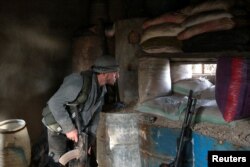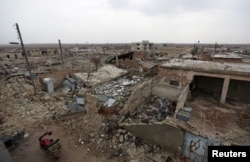Turkey is warning that violations of the cease-fire in Syria could jeopardize peace talks planned for later this month.
Russia and Turkey, which support opposing sides in the conflict, brokered the nationwide halt in fighting last week, building on their efforts to arrange the peace negotiations to be held in Astana, Kazakhstan.
"If we cannot stop the increasing violations, the Astana process could fail," Turkish Foreign Minister Mevlut Cavusoglu told the state-run Anadolu news agency Wednesday.
He blamed pro-government fighters, including the Lebanon-based Hezbollah militant group, for violating the cease-fire. Cavusoglu also said Russian officials were due to visit Turkey next week to discuss the framework for the peace talks.
Syria's main rebel groups have cited government violations of the truce in their decision to suspend participation in the peace talks process.
Along with a government-led assault on Wadi Barada, a rebel-held area near the Syrian capital, insurgents also are complaining about major airstrikes in the provinces of Hama and Idlib, and a regime push on the Eastern Ghouta suburb of Damascus.
"As these violations are continuing, the rebel factions announce... the freezing of all discussion linked to the Astana negotiations," wrote 10 factions in a joint statement.
The suspension amounts to a significant setback to a Moscow-led negotiation process that has sidelined the West as it includes two of the largest armed factions - the Free Syrian Army and the powerful Islamist alliance Jaish al-Fatah (Army of Conquest).
"The regime and its allies have not stopped shooting and have launched major and frequent violations, notably in the regions of Wadi Barada and Eastern Ghouta. Any [advance] on the ground goes against the [cease-fire] agreement and if things don't return to how they were before, the accord will be considered null and void," the factions warned.
Ongoing offensive
Monitoring groups confirmed there has been no let-up in a two-week-long regime offensive on villages in the Barada valley, 15 kilometers from Damascus, where Syrian and Russian warplanes have mounted daily bombing raids, including the dropping of barrel bombs.
Wadi Barada, which has been besieged by the regime since mid-2015, is the main source of drinking water for Damascus’ 4 million inhabitants and supplies have been seriously disrupted in recent weeks with both sides blaming the other for the interruption.
The Syrian Observatory for Human Rights, a Britain-based monitoring group that relies on a network of activists in Syria for its information, reported that about 1,000 civilians, mostly women and children, fled Wadi Barada in recent days. Much as with other besieged rebel-held areas, the regime has pursued a starve-or-surrender strategy, say analysts, hoping to pressure rebels into withdrawing.
According to the Syrian Observatory, two civilians were killed Monday by snipers in a village in Wadi Barada. Fierce ground clashes have continued for days between regime forces with militiamen from the Lebanese Shi’ite movement Hezbollah in the vanguard and rebel fighters, including al-Qaida-linked rebels. The nationwide cease-fire organized by Russia and Turkey excludes the Islamic State terror group and Jabhat Fateh al-Sham, an al-Qaida faction formerly known as al-Nusra Front.
A dozen civilian casualties have been documented elsewhere in Syria. Monitors say two civilians were killed on the third day of the cease-fire, which began on Friday, during a regime bombardment in Homs province and a sniper killed a civilian on the outskirts of Douma city. Two children from one family were killed in artillery shelling in the western countryside of Aleppo.
Numerous breaches
The Russian-Turkish-brokered truce is the third cease-fire in Syria in the past year. On Saturday, the United Nations Security Council approved the cease-fire deal. The Syrian Network for Human Rights recorded no fewer than 77 regime breaches in the first 72 hours.
In a report, the group stated, “72 breaches were by the Syrian regime forces,” mostly in Homs and the Damascus suburbs. “Five breaches were by Russian forces including four in Aleppo whereas the fifth breach was recorded in Hama,” the group said in its report.
The Syrian Network urged Moscow, as a primary sponsor of the agreement, to apply pressure on the Assad regime to “commit to the agreement’s provisions, otherwise, the cease-fire will ultimately fail.” It added, “Russian forces have to adhere to the agreement, and cease bombing civilians because any other breaches by the Russian forces, who should supposedly oversee the implementation of the agreement, will demolish the credibility of any future Russian sponsorship.”
Syrian military officials say they have not been violating the truce as they have been targeting jihadist groups excluded from the cease-fire agreement from the outset.
Members of the High Negotiations Committee, a political opposition body that has been representing the rebels and anti-Assad activists at the now stalled U.N.-brokered Geneva peace process, say they have so far not received invitations to attend the Astana talks.
Rebel leaders say they suspect Moscow wants to try to exclude the HNC and to talk only with the armed factions and “approved” opposition groups that are based in Damascus.
Meanwhile, it emerged Tuesday that a 20-year-old Briton, a one-time chef from southern England, was killed on December 21 while fighting the Islamic State group just north of Raqqa. Ryan Lock, who had no previous military experience, joined the Kurdish militia, the People's Protection Units (YPG), last August, telling his family that he was going on vacation to Turkey. The YPG told his family he was killed along with four other YPG militiamen.













